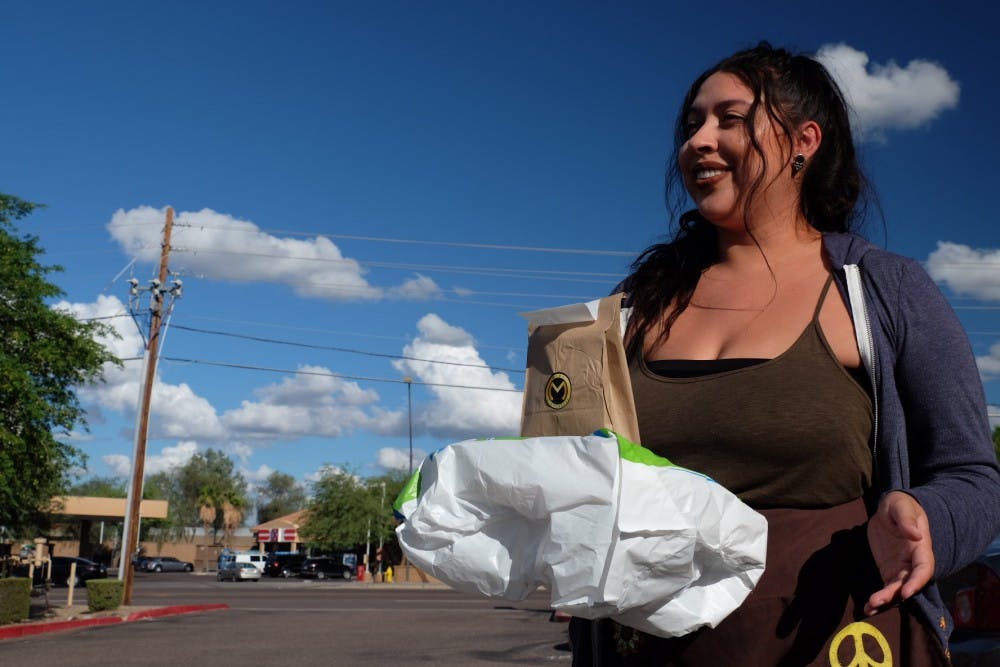A chef gives his creation one last look before he places it into a to-go box. The kitchen is quiet and pristine – the smell of food lingers in the air. Each recipe is carefully crafted and features a key ingredient: cannabis.
The Mint Dispensary is the first medical marijuana kitchen in the country and offers food that is nutritious, made-to-order and infused with cannabis oil. This kitchen goes beyond the typical "weed brownies," offering pizza, artisan veggie burgers and mac and cheese.
The Mint Dispensary, located at the intersection of Baseline Road and Priest Drive, offers take-out food for customers with medical marijuana cards.
For executive chef Carylann Principal, figuring out the recipes relies on one key subject: math.
“It’s a lot of calculations but most importantly, it’s just another ingredient – a ‘cannabis kiss’ if you will,” Principal said.
Once a personal chef, Principal began exploring the world of marijuana-infused foods ten years ago. According to Principal, one of her clients was recovering from a mastectomy and eventually asked Principal to add cannabis oil to a recipe.
“Initially, I had no idea what to do. I mean, I tell my kids to stay away from drugs. I went home, and I did a ton of research and was terrified that she gave me this thing,” Principal said.
After a night of research, Principal presented the meal, butternut squash ravioli with cannabis-infused olive oil, to her client. Principal received a call the next morning from the client, who thanked her for the meal and for her first full night of sleep since she had been diagnosed with cancer.
All of the meals offered in the kitchen are vegetarian and health-oriented, a stark difference from the cookies and candies also offered at the Mint Dispensary.
For many people with medical marijuana cards, such sugary foods make edibles an impossible form of medication. Because sweets dominate the edible market, those who cannot smoke or consume sugar-filled edibles are often forced to find other options if they wish to use medical marijuana.
As a cancer survivor herself, Principal knows that health and dietary restrictions are a key factor in many consumers’ diets and wanted to provide healthier options than desserts.
Even though health is a main concern, many people with medical marijuana cards are more excited about the new direction edibles have taken.
“I’ve never had a weed-infused pizza; the idea of that is so weird, but here it is. This is definitely a step up, and I can’t wait to see where the weed industry goes from here,” Odette Olivares, a senior majoring in biology, said after purchasing a meal from the kitchen.
The Mint Dispensary offers many forms of cannabis. Due to the nature of the meals, all food orders, including those from the kitchen, are taken to-go.
There are many steps one must take if they wish to get a medical marijuana card. For adults in Arizona, a valid Arizona license or identification card is needed as well as a residential address. Many different conditions can qualify someone for a medical marijuana card such as cancer, glaucoma, chronic pain and post-traumatic stress disorder.
While medical use is legal in Arizona, recreational use is still illegal, and non-medical possession will result in fines and jail time. However, according to freshman criminology and criminal justice major Ryan Carlson, it is possible that the laws will change in the near future.
“We just talked about marijuana in one of my classes. Right now, marijuana is seen as a non-deviant drug, meaning that a lot of people believe that it should be legal,” Carlson said. “It’s also interesting because ASU is a dry campus, including medical marijuana, which some students rely on for real medical reasons. I know a lot of people who go to ASU and also have their med cards. It gets difficult for them to go without medication.”
According to ProCon.org, 162,528 Arizona residents were medical marijuana patients as of May 2018. This is equivalent to 23.16 patients per 1,000 residents. The number has increased significantly since March 2016, which states that 89,405 Arizona residents were medical marijuana patients.
On the other side of the spectrum, Tommy Thompson, public information officer for the Phoenix Police Department, believes that medical marijuana rides a thin line.
“There is not much clinical data outlining what a prescribed dosage should be. Because of that, users are left to self medicate and determine what dosage to use. Look at the problems with self-medicating with alcohol,” Thompson said.
Though marijuana remains a hot-button topic, the Mint Dispensary hopes to de-stigmatize and re-invent the use of cannabis through food.
Reach the reporter at kreinha3@asu.edu and follow @ReinhartKatelyn on Twitter.
Like The State Press on Facebook and follow @statepress on Twitter.




